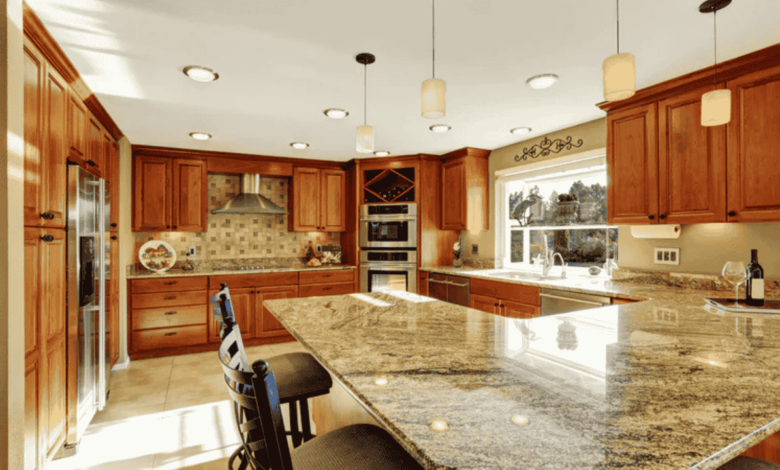FAQs About Granite Countertops

Granite is a durable, heat-resistant, low-maintenance stone used in kitchen and bathroom countertops. The stone is among the hardest natural materials and provides scratch-resistant countertops. Granite countertop installation is also quick and customizable, so your design won’t resemble any other. Here are FAQs about granite countertops:
What Are the Benefits of Granite Countertops?
Granite countertops are durable and resistant to heat, stains, scratches, and cracks. You can use trivets and wood boards to protect the surface from direct contact with hot pans and pots. Since granite material forms naturally from cooled magma, each slab bears unique patterns. The natural color patterns and striations in your countertop will be distinct from all granite countertops worldwide.
This material requires periodic sealing to prevent staining and moisture absorption but remains resilient to normal cooking activities. Granite countertop installation is usually quick and tailored to your needs. You can choose from various patterns and colors produced by natural mineral composition. The material is also associated with high-end countertops and features low maintenance, only involving routine cleaning with mild soap and warm water.
Where Can I Install Granite Countertops?
You can install granite countertops in your kitchen, bathroom, fireplaces, and other areas. The material is durable, provided you protect it from heavy and hot objects. Granite countertops offer natural aesthetics ideal for businesses, including food service counters, reception tops, and conference tables. You can also use it for home kitchen counters, window sills, shower edges, and bathroom vanity tops.
It’s advisable to use hot pads and covers to protect kitchen granite countertops from thermal shock and related damages. Avoid abrasive cleaning sponges, acidic cleaners, bleaches, and other harsh chemicals to prevent tarnishing. Granite countertops come in both standard and custom sizes fabricated to fit your space. The slabs are also easy for professionals to cut and trim to make sure they can fit any space. Once the installer takes measurements and puts countertops in, you can use them around sinks, cabinets, and other areas. Experienced installers also seal any seams from using multiple slabs, making the lines inconspicuous.
Are Granite Countertops a Good Option?
Granite, marble, and quartz are all ideal materials for countertops and offer various advantages. The choice between these materials and minerals is subjective based on personal preferences. Granite slabs come in many colors, including white, grey, black, blue, green, and red. Blue and red granite are the rarest hues and can last for a lifetime if properly maintained. The material is porous and requires seals to prevent moisture and stains from coffee, wine, and other colored foods from seeping through. Installation and maintenance are comparable with other materials, but granite is one of the hardest materials and offers enhanced durability. You can repair damaged countertops using resin or epoxy without affecting the countertop’s uniqueness.
Find Reliable Granite Countertop Installation Today
Granite offers increased sturdiness and should remain flat for its entire lifecycle, providing a solid, chip-resistant countertop. The material is also repairable and can withstand higher temperatures and blows than high-end countertop materials. Contact a granite countertop installation company today to learn more about existing options and their benefits.




